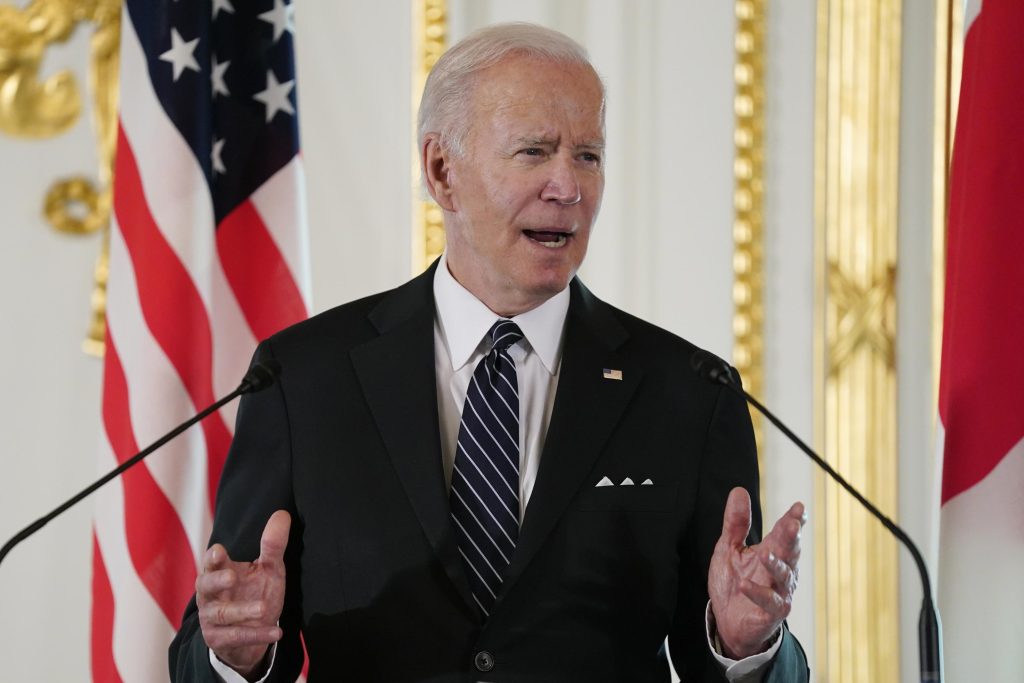
Tokyo (AFP) – President Joe Biden said Monday that the United States would intervene militarily if China were to invade Taiwan, saying the burden of protecting Taiwan was “stronger” after Russia’s invasion of Ukraine. It was one of the most powerful presidential pro-autonomy statements in decades.
Biden, at a press conference in Tokyo, said “yes” when asked if he would be willing to intervene militarily to defend Taiwan if China invaded. “This is the commitment we made,” he added.
The United States has traditionally avoided offering such an explicit security guarantee to Taiwan, with which it no longer has a mutual defense treaty, and instead has maintained a policy of “strategic ambiguity” about how far it would be willing to go if China invaded. The Taiwan Relations Act of 1979, which governs U.S. relations with the island, does not require the United States to intervene militarily to defend Taiwan in the event of an invasion by China, but it does make it U.S. policy to ensure that Taiwan has the resources to defend itself and prevent anything unilateral. Changing the situation in Taiwan by Beijing.
Biden’s comments were met with a sharp response from the mainland, which claimed Taiwan was a rogue province.
Chinese Foreign Ministry spokesman Wang Wenbin expressed “strong dissatisfaction and firm opposition” to Biden’s comments. “China has no room for compromise or concessions on issues involving China’s core interests such as sovereignty and territorial integrity.”
“China will take resolute measures to protect its sovereignty and security interests, and we will do as we say,” he added.
A White House official said Biden’s comments did not reflect a shift in policy.
Speaking alongside Japanese Prime Minister Fumio Kishida, Biden said any effort by China to use force against Taiwan “would be inappropriate,” adding that it “would lead to disruption of the entire region and would be another measure similar to what happened in Ukraine.”
China has escalated its military provocations against democratic Taiwan in recent years with the aim of intimidating it into accepting Beijing’s demands for unification with the communist mainland.
“They’re really flirting with the danger right now by flying close to them and all the maneuvers that are going on,” Biden said of China.
Under the “one China” policy, the United States recognizes Beijing as the government of China and has no diplomatic relations with Taiwan. However, the United States maintains unofficial contacts including a de facto embassy in Taipei, the capital, and provides military equipment to defend the island.
Biden said his “expectation” was that China would not attempt to seize Taiwan by force, but said the assessment “depends on how strong the world is showing that this kind of action will lead to long-term indignation by the rest of society.”
He added that deterring China from attacking Taiwan was one of the reasons why it was important for Russian President Vladimir Putin to pay a heavy price for his barbarism in Ukraine, lest China and other countries understand the idea that such a measure is acceptable.
Fearing an escalation with a nuclear-armed Russia, Biden quickly ruled out putting U.S. forces in direct conflict with Russia, but shipped billions of dollars in U.S. military aid that helped Ukraine resist a stronger-than-expected Russian onslaught.
Taipei welcomed Biden’s comments, with State Department spokeswoman Joanne O expressing a “sincere welcome and gratitude” for the comments.
“The challenge posed by China to the security of the Taiwan Strait has aroused great concern in the international community,” said Oe. “Taiwan will continue to improve its self-defense capabilities, deepen cooperation with the United States, Japan and other like-minded countries to jointly defend the security of the Taiwan Strait and the rules-based international order, while promoting peace, stability and prosperity in the Indo-Pacific region.”
This isn’t the first time Biden has vowed to defend Taiwan against a Chinese attack, only for administration officials to later claim that there has been no change in US policy. At CNN’s city council in October, Biden was asked about using the US military to defend Taiwan and replied, “Yes, we have an obligation to do so.”
Biden’s comments came before he officially launched a long-awaited Indo-Pacific trade agreement that excludes Taiwan.
White House National Security Adviser Jake Sullivan emphasized Sunday that Taiwan is not among the governments registered in the Indo-Pacific Economic Framework, which aims to allow the United States to work closely with major Asian economies on issues such as supply chains and digital trade. Clean energy and anti-corruption.
The inclusion of Taiwan would have angered China.
Sullivan said the United States wants to deepen its economic partnership with Taiwan on a one-to-one basis.
—-
Miller reported from Washington. Writer Darlene Superville for the Associated Press in Washington contributed to this report.




More Stories
Journalists convicted in Hong Kong sedition case
Stand News: Hong Kong journalists convicted of sedition in case critics say highlights erosion of press freedom
Shark decapitates teen off Jamaica coast